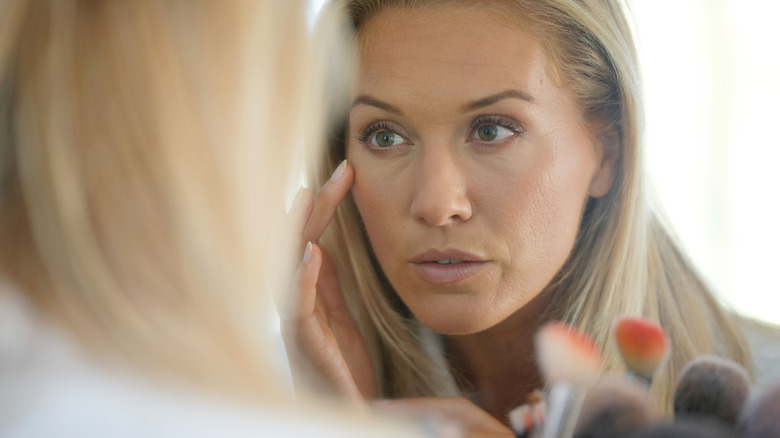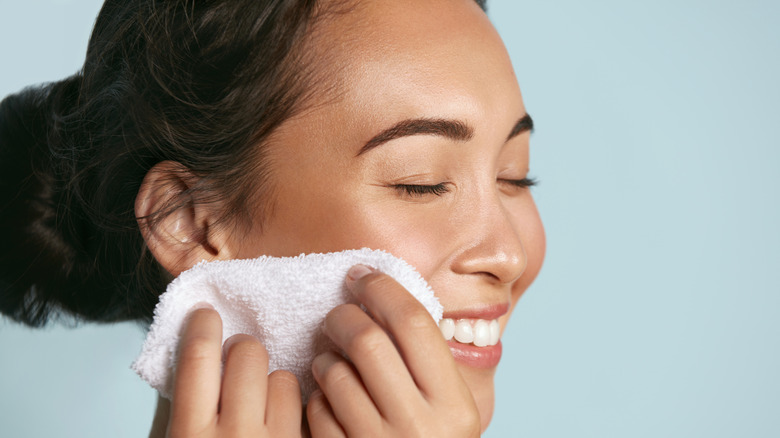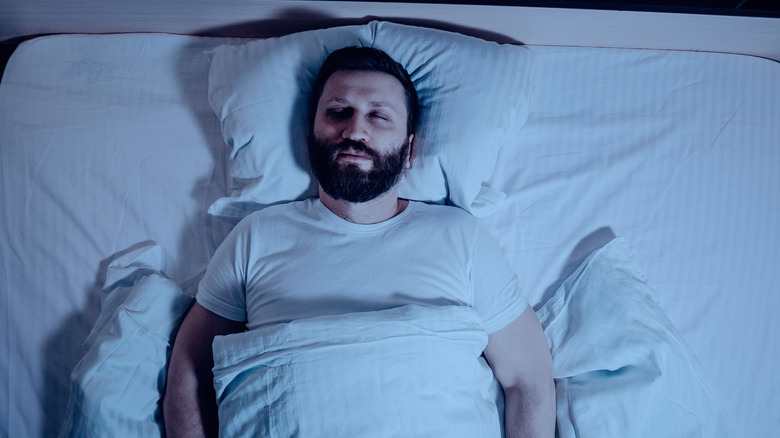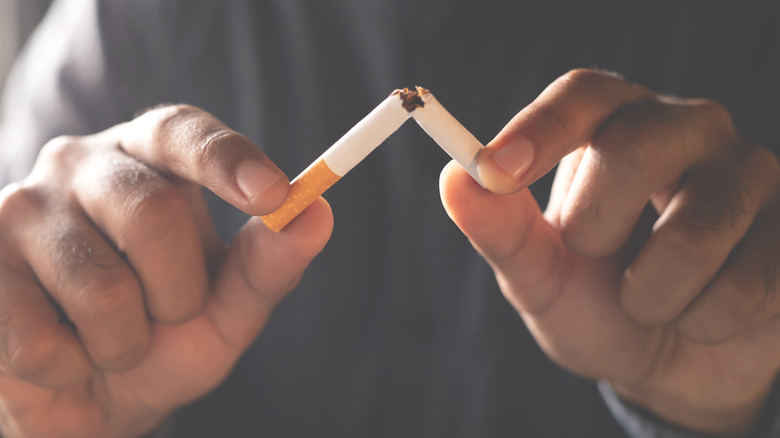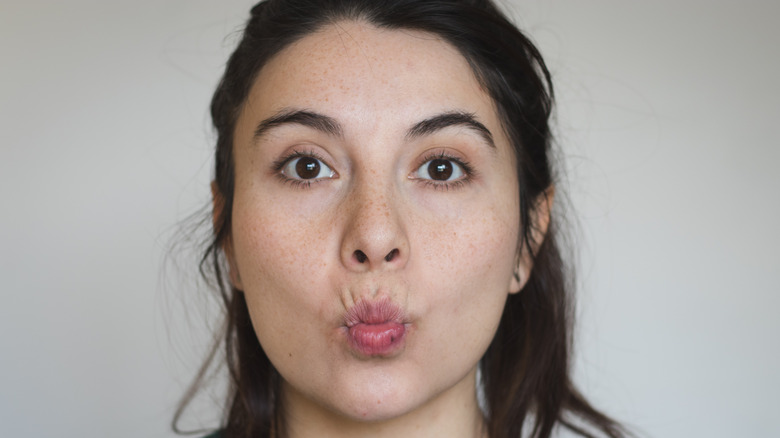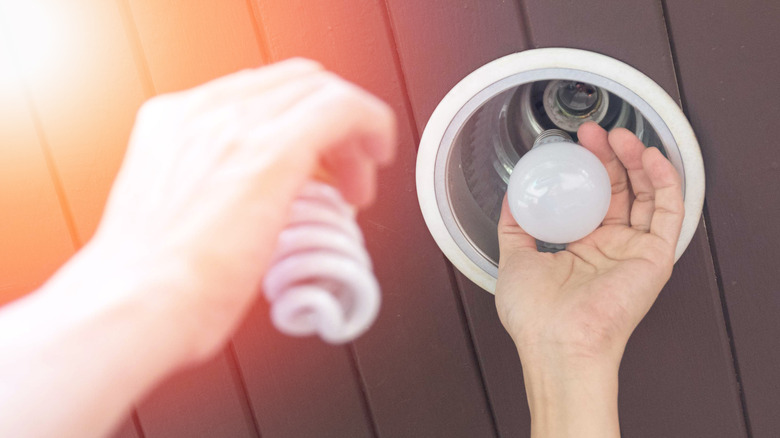Things You Never Realized Were Giving You Wrinkles
Whether we like it or not, eventually we start to show signs of aging — especially on our skin. We put our skin through the wringer between the weather elements, lifestyle factors, and just not taking the time to care for our skin properly.
As we get older, our skin becomes rougher, thins out, loses elastic tissue (which causes it to hang loosely), and becomes more fragile overall. You may also notice your face loses fat around your eyes and in your cheeks, among other areas (via WebMD). But perhaps the most noticeable sign of aging on our skin is wrinkles — those creases and lines that form in the skin, which can eventually become deeper furrows (via Mayo Clinic).
Although wrinkles are a natural result of aging skin, habits and environmental factors can contribute to premature fine lines. Here are some things you never realized were giving you wrinkles.
Repetitive facial expressions
Have you ever heard of the expression, "your face will freeze that way"? Well, the jury is still out on if that's actually true, but making the same facial expressions over and over again will cause wrinkles. It happens because of the muscle contractions that occur when you make a facial expression. If done repetitively over years with the same muscles, the lines will become permanent (via American Academy of Dermatology Association).
Some examples of repetitive facial expressions that can cause wrinkles are frowning, furrowing your brow in concentration, sipping out of a straw, as you pucker your lips frequently forming wrinkles around your mouth, cosmetic dentist Dr. Lana Rozenberg told the Best Life. Even smiling a lot over many years can break down the skin's collagen, causing wrinkles. But that shouldn't stop you from smiling — not at all. Having an expressionless face sounds like no fun, so just enjoy brightening up your face with a smile and ignore the fine lines.
How you apply and remove your makeup
When you're feeling like your face isn't looking up to its full potential, you probably automatically grab for your trusty makeup bag to spruce it up. But be cautious when applying your makeup — especially your eye shadow, mascara, or eyeliner.
Dr. Rachel Nazarian of Schweiger Dermatology Group told Byrdie that most people gaze into the mirror and raise their eyebrows up high, creating lines on their forehead when they apply makeup. This creates lines across the forehead that will eventually stick around after enough time has passed. You should also be mindful of your eyeliner application, as pulling on those sensitive eyelids too hard can break down the collagen and cause wrinkles (via Theraderm). Be gentle with that skin around your eyes overall, lightly tapping your eye cream instead of applying aggressively.
The issue doesn't just lie within the application of makeup, but also the removal. Rigorously rubbing your eye makeup remover is too rough on that sensitive skin and may be a sign you need a new product.
Squinting in the sunlight
Wearing sunglasses should be more than a fashion choice. Shades protect your eyes from the powerful sun, as well as keep you from squinting. Not only is squinting irritating, it can cause lines to develop around your eyes by the repeated contraction of periocular muscles (via Byrdie).
These lines are typically at the side of your eyes and although they may start fine, eventually they can turn into deep crevices thanks to the sun's powerful UV rays. You will also want to make sure you have the right prescription for your glasses, as eyestrain is another reason people squint, according to the Colorado Springs Dermatology Clinic.
If it's already too late and the wrinkles are already present around your eyes, there are some options. You can try topical creams to increase moisture and collagen. However, know that it won't remove the wrinkles, it'll just make them less noticeable, per the clinic. Injections, fillers, and chemical peel treatments are other options to manage those squinting wrinkles.
Tech neck (gazing down at your phone too much)
We all are heavily reliant on our smartphones these days, which can present numerous problems. Now you can add wrinkles to that ever-growing list. Turns out it's not just your face that tells your age — your neck can be a giveaway. Spending lots of time looking down at your phone can create wrinkles in your neck, coined as the term "tech Neck" (via Byrdie). Cosmetic surgeons say the downward gaze causes more wrinkles than would naturally occur. Some even offer facials specific to neck wrinkles caused by smartphones (via Forbes).
Obviously giving up the smartphone entirely is probably not a feasible option. Instead, try holding your smartphone up at a higher level and avoid looking down as much to see if that helps prevent wrinkles. Next time you're looking at your phone, look at the folds in your skin on your neck to see if you already see wrinkles developing.
The way you sleep
We all know that beauty sleep is imperative for health and wellness. In fact, lack of sleep has been linked to signs of aging because you're not giving your body time to refresh itself (via Best Life). But did you know the way or position you sleep in can affect wrinkle development? Dermatologist Hadley King told Stylecaster that we develop lines and wrinkles on the side of our face that we most commonly sleep on.
Not to fear! Apparently, the solution can be as simple as switching out your pillowcase and changing positions. Sleeping on silk pillowcases instead of the typical cotton can reduce those lines we wake up in the morning with, King said. But you also may want to modify your sleeping position. A 2003 Scandinavian study found that sleeping on your stomach or side can cause your skin to be more wrinkled (via Best Life). So lying flat on your back may keep those face wrinkles at bay.
Having a poor diet
Your youthful appearance relies heavily on what you put into your body. Studies show that eating a nutritious diet of fruits and vegetables may prevent premature skin aging, whereas a diet of sugar and carbohydrates can accelerate the aging process (via American Academy of Dermatology Association). But don't go starting on a crash diet to kick your health into gear.
Those unsustainable diets that have you yo-yoing from quick weight loss to weight gain can accelerate the skin elasticity loss that occurs naturally over time. "Maintaining a more stable weight will increase the tautness of your skin," King told Stylecaster. So if you want to lose weight, try the old-fashioned way of eating nutritious foods and exercising regularly.
Hydration is also a key part of a healthy diet — and it can make your skin look plumper, dermatologist David E. Bank told Best Life. Water helps plump the skin internally, Bank said, giving the appearance of less dry or wrinkly skin.
Not exercising daily
We all know that exercise and nutrition are key to a healthy lifestyle. But did you know that daily exercise can actually make your skin glow? Dermatologist Marisa Garshick told Insider that pumping iron and getting your heart rate up can increase your blood circulation and deliver oxygen and nutrients right to your skin. This keeps "the skin healthy, promotes collagen production, and promotes new skin cells which keeps the skin looking glowing and is also helpful for anti-aging," she said.
Contrary to popular belief, the sweat session at the gym may actually help your pores. Be sure to remove any makeup or products that can clog your pores and let the sweat clear them out, according to Insider. You may also experience that "post-workout glow" — a combination of increased blood flow, your sweat, and those endorphins that are released that make you feel great. This glow can last up to several hours after exercising.
Smoking cigarettes and drinking alcohol
The health dangers of smoking are certainly known today. But now you can add premature wrinkles to the list of smoking-related issues. Smoking cigarettes can speed up your skin's natural aging process and cause wrinkles around the mouth. Other impacts to your skin include "crow's-feet, pronounced lines between the eyebrows, uneven skin complexion, a grayish tone on lighter skin, deep creases and puffiness below the eyes, wrinkles around the mouth, and thinner lips" (via Mayo Clinic).
The chemicals in cigarettes, like nicotine, can also keep nutrients from getting to your skin cells in the first place, as well as affect your skin's elasticity. Once these changes occur, they can't be reversed, so be sure to evaluate how important skin health is before lighting up.
What if alcohol is more your vice? Well, unfortunately, drinking also has negative effects on your skin. Nutritionist Jairo Rodriguez told Vogue, "Alcohol is actually one of the worst, most aggressive compounds to destroy your skin." It dehydrates your skin, causing wrinkles and inflammation. How bad the damage is to your skin depends on how much and for how long you have been drinking, the publication noted.
Speaking romantic languages
This one sounds a little odd, but it is in the same realm as repeated facial expressions causing wrinkles over a period of time. Experts say those who speak "romance languages" like Italian, French, or Spanish have more of a risk of wrinkles around their mouth due to pursing their lips (via Stylecaster).
Dr. S. Manula Jegasothy, founder of Miami Skin Institute, told Stylecaster that French, Spanish or Italian speakers tend to purse their lips more to enunciate words, which in turn causes vertical lines around their lips over time. These lines are often thought of as "smoker lines" but can be the result of pursing your lips together while doing anything from drinking through a straw, talking, or yes, smoking.
Now that's not to say that English speakers who happen to purse their lips while enunciating can't develop these lines as well. Next time you're talking, you can check in a mirror to see the ways your mouth moves and if you're at risk for these fine lines.
Tanning and fluorescent lighting
By now, you have probably heard how indoor tanning beds are bad for your skin. It turns out that some of the negative effects also go for indoor fluorescent lighting in your office. Dr.Jegasothy from the Miami Skin Institute told Stylecaster that sitting under fluorescent lights at the office 40 hours a week can add up to significant UV radiation over the course of 30 to 40 years. This exposure can accelerate the aging of your skin, but it doesn't appear to be enough to cause skin cancer.
One study found that skin cells affected by UV rays from fluorescent lights had a lack of ability to produce healthy collagen as opposed to the lighting from incandescent bulbs (via Venus Treatments). Researchers added that you can distance yourself to at least two feet away from the fluorescent bulbs — or just don't use them at all, opting for incandescent or LED lights.
Additionally, wear sunscreen at all times to battle UV rays – even when not going outside. You also should avoid tanning in general, opting for a sunless tanner if desired.
Chewing gum incessantly
If chewing gum is a habit you can't seem to break, you may want to listen up. Cosmetic surgeons believe that compulsive chewing of gum can cause wrinkles around your mouth (via NBC News). You may be wondering how something as simple as chewing a piece of gum could possibly lead to fine lines.
"I believe chewing gum promotes muscle over-activity and potentially breaks down support tissue within the skin, contributing to volume loss and perhaps loss of skin elasticity," Dr. Hema Sundaram told NBC News. Yes, the repetitive motion of chewing may overuse your muscles and causes wrinkling around your lips.
Oh, and if you've already leveraged some fillers to counteract existing wrinkles, you may want to still consider ditching the gum. The chewing motion can dislodge those fillers earlier than usual, meaning your old wrinkles may resurface — and you could add new wrinkles. However, more research is needed to fully understand a possible link between chewing gum and wrinkles around your mouth.
Not getting enough sleep or being too stressed
Proper skin care isn't just about topical creams and treatments. Taking care of yourself mentally is also a necessity for healthy skin. There's a reason why they call it "beauty sleep"; being sleep-deprived can fast-track aging.
A 2013 study from the University Hospitals Case Medical Center found that poor sleepers had "increased signs of intrinsic skin aging including fine lines, uneven pigmentation and slackening of skin and reduced elasticity" (via ScienceDaily). The study also found that people who suffered from lack of sleep recovered slower from environmental impacts on their skin like UV radiation, whereas those who had a good quality of sleep recovered efficiently and effectively from the skin stressors, according to researchers.
If you're worried about wrinkles, you should know that your stress level even plays a role in your skin health. Cortisol, aka the stress hormone, can also lead to lines and wrinkles, age spots, and skin dullness, licensed aesthetician Erma Morris told Best Life.
Failing to protect your skin in the car
Skin protection is important in any environment. This is true even in the car. Yes, your skin needs protection from the sun while driving or riding as a passenger because your vehicle doesn't block out all of the harmful UV rays. The glass used in vehicles usually blocks out sunburn-causing UVB rays, but not the UVA rays that cause aging, according to the Skin Cancer Foundation.
While windshields are typically treated to block out UVA rays, you'll likely still be left partially unprotected thanks to your sunroof, side, or back windows. Broad spectrum sunscreen, sunglasses, and sun-protective clothing are particularly important on your side that faces the window while driving or navigating from the passenger seat (via Best Life). You can also keep your skin safe in the car for a longer period of time by installing UV-blocking window film on untreated windows (via Skin Cancer Foundation).
These factors won't lead to wrinkles
While there are many things that can lead to wrinkles, there are plenty of myths out there regarding these fine lines. For instance, genetics don't have much to do with wrinkles. So, no, you unfortunately can't blame your parents for premature aging (via Penn Medicine). Wrinkles won't start at a specific time because they did for your parents. You also may have heard that moisturizing can prevent the formation of wrinkles. Although that's not true, it can make them less noticeable. Moisturizing brightens your complexion, giving off an anti-aging glow.
So, what should you do? At risk of sounding like a broken record: Sunscreen! It's a necessity and one of the easiest ways to prevent skin damage — and, yes, wrinkles. According to the American Academy of Dermatology Association, you should opt for sunscreen with an SPF of 30. Wear it every day — whether you're going outside or staying in — and avoid tanning in the sun or using a tanning bed.
Unfortunately, there is no quick fix or guaranteed anti-aging method, as each person's skin is different and requires different treatment, according to Penn Medicine. And don't be fooled: The most expensive products aren't necessarily the most effective anti-aging ones. Remember to keep your skin healthy by moisturizing, and make sure to see a dermatologist to find the right skin care products for you.

